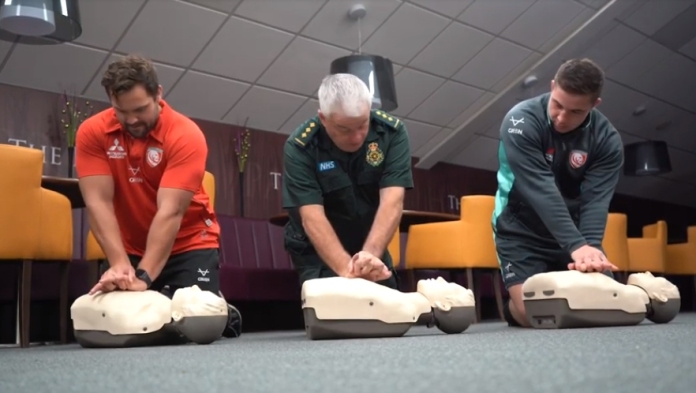South Western Ambulance Service NHS Foundation Trust (SWASFT) is urging people to learn what to do if someone collapses or stops breathing normally.
Only around 1 in 10 people survive a sudden cardiac arrest in the UK, although bystanders can make a big difference if they take the right action fast.
According to Resuscitation Council UK (RCUK), “every person should learn to provide the basic skills to save a life”.
People should call 999 immediately if someone is unconscious or not breathing normally. Emergency call handlers will support them to begin safe CPR if required, and to use a defibrillator if one is available.
Amy Sainsbury, SWASFT Senior Clinical Lead, said: “Sadly many cardiac arrests happen every day, and they often involved people’s loved ones. So it’s vital that everyone knows what to do when someone collapses or stops breathing normally.
“Our Saving Lives Together campaign encourages people to learn CPR, so they can have the confidence to put it into action if required.”
“When someone has a sudden, unexpected cardiac arrest, doing nothing is the only way of making their situation worse.”
“It’s vital to recognise when someone needs urgent help, call 999 for an ambulance, and be prepared for the call handler to help you to start CPR and use a defibrillator.”
“These actions really could be the difference between someone living or dying. By working together we can give people the best-possible chance of survival.”
Denmark footballer Christian Eriksen had a cardiac arrest during a Euro 2020 match on 12 June. But he was successfully resuscitated on the pitch, due to the early recognition of the emergency followed by rapid CPR and defibrillation.
There are around 60,000 cardiac arrests out of hospital every year in the UK, and around 80% of these occur in the home. A person’s chance of survival decreases by up to 10% every minute without CPR and defibrillation.
Public access defibrillators are used in fewer than one in 10 out-of-hospital cardiac arrests, according to RCUK, even though there is an initially shockable rhythm in approximately one in four patients.
SWASFT recently joined the national defibrillator network The Circuit to help bystanders access the nearest available device and give patients a better chance of survival.
Rob Horton, SWASFT Responder Manager, said: “We are delighted to be one of the first UK ambulances to join The Circuit, which will further improve our ability to save lives together across the South West.”
“The British Heart Foundation in conjunction with the Association of Ambulance Chief Executives has driven this project to share defibrillator locations and improve availability of access across the country at the time of need.”
“We have been working hard to ensure our own defibrillators and those owned privately are added to the database, which is already being used in our 999 Control Rooms.”
It is expected that all UK ambulance trusts will join the network by September 2021.







